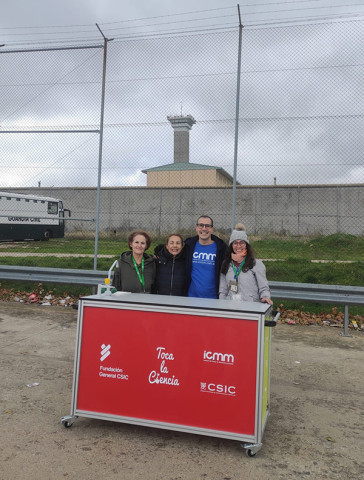Íñigo Bretos brings science to prison alongside the NGO Solidarios: "I'll repeat"

The researcher at the Institute of Materials Science of Madrid (ICMM-CSIC) Íñigo Bretos has taken the center's science to a new level thanks to the NGO Solidarios. It was last Saturday when the researcher went to the Soto del Real prison to give them the 'ceramics to see sound and breathe water' workshop.
The NGO Solidarios works with people with social exclusion in different areas, including the prison. Through an agreement with the Higher Council for Scientific Research, some people most involved in dissemination activities were contacted to give 90-minute talks to the prison population. "I told them about the 'Touch Science' cart, and they thought it was a good idea," says Bretos.
After months of preparations and balancing agendas, the day finally arrived on October 28, when she traveled to Soto del Real with four volunteers from the NGO and the two-meter-long 'cart' in which a portable laboratory is simulated. Once the relevant security to enter was verified, Bretos found himself in front of 23 men between approximately 20 and 50 years old.
"The workshop was exactly the same as the one I have done at any other dissemination event: the same words, forms, and their attitude was wonderful," comments the researcher, who is also coordinator of the ICMM Outreach Commission. CSIC. In fact, both he and the commission team aim to "open the approach to disclosure" to more disadvantaged and stigmatized environments. "It is our social work, with this society increases its scientific culture and, in addition, enjoys it," he defends.
During his day with the prisoners, Íñigo Bretos carried out the aforementioned experiment, which is "very colorful," he says. "We did experiments with piezoelectric materials; for example, we saw through them how they have the hearing threshold," he details, and here he pauses briefly to comment on how the majority of prisoners "had it quite well; in some places, we have identified principles of deafness".
They then observed the resonance frequency of a drop of water, something used in ultrasonic nebulizers such as home humidifiers. They finished the practice with a microphone where they could check what their voice was like. "It was the funniest moment, the prisoners treated each other like family and they joked a lot," he says.
The experience, he confirms, could not have been better: "I thought there would still be a certain part of the public that did not pay attention, but nothing like that," he admits. "I'll repeat, I'm sure" he says without a doubt after leaving the activity. And he will not do it alone: "More colleagues from the 'Toca la Ciencia' project have told me that they want to sign up," he announces.
He will return for the pure enjoyment of an inspiring activity for both sectors, but also because the prisoners asked him to, and "it is impossible to refuse." "The people of Solidarios made it very easy, but so did the prisoners," acknowledges Bretos, who highlights the interest they showed at all times and how they even asked him for advice about his future release from prison and the most powerful new technologies to which he they could be dedicated.
Instituto de Ciencia de Materiales de Madrid (ICMM)
Sor Juana Ines de la Cruz, 3
Cantoblanco, 28049
Madrid, España
Telephone: (+34) 91 334 90 00
Email: @email
Communication Office: @email

Acknowledge the Severo Ochoa Centres of Excellence program through Grant CEX2024-001445-S/ financiado por MICIU/AEI / 10.13039/501100011033

Contacto | Accesibilidad | Aviso legal | Política de Cookies | Protección de datos